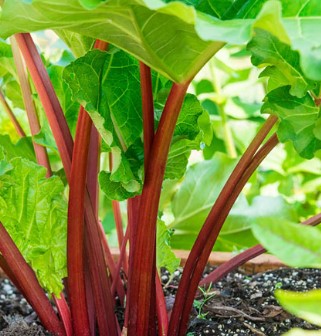Turkey rhubarb, also known as Rheum palmatum, is a type of medicinal plant native to Asia and Europe. It has a long history of use in traditional Chinese and Ayurvedic medicine for its alleged medicinal properties. In recent years, it has gained popularity as a natural supplement due to its high content of beneficial compounds, including antioxidants, fiber, and other nutrients. In this blog post, we will explore the various health benefits of Turkey rhubarb and discuss how it can be incorporated into a healthy lifestyle.
What is Turkey Rhubarb and How is it Harvested?
Turkey rhubarb is a type of medicinal plant native to Asia and Europe. It is typically harvested from the wild, although some cultivation of the plant is also taking place. Turkey rhubarb has a long, thick root with reddish-brown skin and a white, fleshy interior. It is traditionally used in a variety of dishes in Asia, including soups, stews, and teas.
Turkey rhubarb is known for its high content of beneficial compounds, including antioxidants, fiber, and other nutrients. It is also a rich source of compounds called anthraquinones, which are believed to have a variety of medicinal properties. These compounds are thought to have a laxative effect, which is why Turkey rhubarb is often used as a natural treatment for constipation.
Health Benefits of Turkey Rhubarb:
Digestive Health: Turkey rhubarb is most commonly used as a natural treatment for constipation due to its high content of anthraquinones. These compounds are thought to stimulate the muscles in the intestines, which helps to improve bowel movements and relieve constipation. Turkey rhubarb may also have potential for relieving other digestive issues, such as bloating, gas, and indigestion.
Heart Health: Some research suggests that Turkey rhubarb may have potential for improving heart health. In one animal study, Turkey rhubarb was found to lower cholesterol levels and improve blood vessel function, suggesting it may have a similar effect in humans. While more research is needed to confirm these findings, Turkey rhubarb may be a useful supplement for those looking to improve their cardiovascular health.
Immune System Support: Turkey rhubarb is a rich source of antioxidants, which are believed to help protect the body from oxidative stress and support the immune system. In one animal study, Turkey rhubarb was found to improve immune function in mice, suggesting it may have a similar effect in humans. While more research is needed to confirm these findings, Turkey rhubarb may be a useful supplement for those looking to boost their immune system.
Weight Management: Some research suggests that Turkey rhubarb may have potential for aiding in weight management. In one animal study, Turkey rhubarb was found to reduce body weight and improve insulin sensitivity in obese mice, suggesting it may have a similar effect in humans. While more research is needed to confirm these findings, Turkey rhubarb may be a useful supplement for those looking to manage their weight.
Skin Health: Turkey rhubarb is also believed to have potential for improving skin health. In one study, Turkey rhubarb was found to improve skin elasticity and reduce the appearance of fine lines and wrinkles in a group of women. While more research is needed to confirm these findings, Turkey rhubarb may be a useful supplement for those looking to improve the appearance of their skin.
How to Incorporate Turkey Rhubarb into Your Lifestyle:
There are a variety of ways to incorporate Turkey rhubarb into your lifestyle as a supplement. One option is to take Turkey rhubarb in capsule form. Capsules are a convenient and easy way to get the benefits of Turkey rhubarb without having to prepare the herb in food or drink. It is important to follow the dosage instructions on the supplement label, as Turkey rhubarb can have a strong laxative effect if taken in large amounts.
Another option is to add Turkey rhubarb to your diet in the form of tea or a decoction. To prepare Turkey rhubarb tea, simply steep the dried root in hot water for several minutes. You can also make a decoction by simmering the dried root in water for a longer period of time. Both tea and decoction can be consumed on their own or sweetened with honey or another natural sweetener.
In addition to taking Turkey rhubarb as a supplement, you can also incorporate it into your diet by using it as a spice in food. Turkey rhubarb has a slightly bitter taste and can be used to add flavor to a variety of dishes, including soups, stews, and stir-fries. It is important to use Turkey rhubarb sparingly, as it can have a strong laxative effect if consumed in large amounts.
It is important to consult a healthcare professional before taking Turkey rhubarb as a supplement, especially if you are pregnant, nursing, or have a medical condition. Turkey rhubarb can have a strong laxative effect and may interact with certain medications. It is also important to choose a reputable brand and follow the dosage instructions on the supplement label.
Turkey rhubarb is a medicinal plant with a long history of use in traditional Chinese and Ayurvedic medicine. It is rich in beneficial compounds, including antioxidants, fiber, and other nutrients, and is believed to have a variety of health benefits. While more research is needed to confirm its effects, Turkey rhubarb may be a useful supplement for those looking to improve their digestive health, heart health, immune system function, weight management, and skin health. It can be taken in capsule form, consumed as tea or a decoction, or used as a spice in food.

